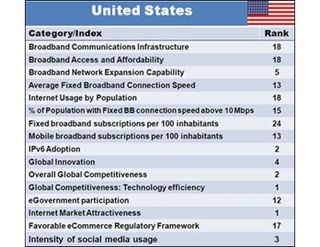U.S. Broadband Services Not World Leaders, Study Finds

Although the U.S. ranks No. 1 in 10 of the 38 categories in a new global "Net Vitality" study, American broadband systems often fall into the middle range in many factors when compared with those in other countries, according to the report, which the Telecommunications Research and Policy Institute unveiled on Wednesday (March 7).
Nonetheless, the "Net Vitality 2.0" report puts the U.S. among the five top-tier countries for global broadband internet ecosystem leaders; but that ranking is based on factors beyond actual Internet operations.
The new study updates a 2015 report. Both reports were intended to help policymakers develop appropriate rules to encourage broadband expansion, according to the reports' author, Stuart Brotman, a University of Tennessee professor and long-time policy official.
The U.S. and United Kingdom made the Top Five in both the 2015 and the new Net Vitality reports, but this year China, Germany and Canada have replaced South Korea, Japan and France as leading broadband Internet ecosystem countries. Brotman said he believes that Australia and Singapore are candidates for a future Top Five list, "thanks to their innovation and competitiveness."
The five leading countries for Broadband Communications Infrastructure are South Korea, Denmark, Ireland, Iceland and the Netherlands. The U.S. is #18, according to the new study. As for Broadband Access and Affordability, the top five are South Korea, Denmark, Finland, Estonia and Norway; again the U.S. is #18. In Average Fixed Broadband Connection Speed, the top five are South Korea, Norway, Sweden, China and Switzerland, with the U.S. coming in at #13.
U.S. systems rank highly in Internet "market attractiveness," "technology efficiency" and IPv6 adoption, according to the report (see chart). In key categories such as Fixed Broadband Subscriptions per 100 inhabitants, the U.S. ranks 24th, well behind relatively small countries such as Monaco, Switzerland and Denmark (ranked 1-2-3) , but also below France, South Korea, Germany, U.K., Canada and China.
The U.S. also scores poorly in categories such as "inherent cyber risk" (#41) and "information and communications technology development" (#27).
The study found that all of the most widely used personal computer operating systems and the top web browsers (Apple Safari, Google Chrome, Microsoft Internet Explorer) originated in the U.S.
Policymaking Tool
As a former National Telecommunications and Information Administration official, a telecom policy advisor to the U.S. State Department and veteran academic (with relationships at Harvard, Massachusetts Institute of Technology and Stanford), Brotman insists that one value of the comparative analysis is to put broadband and Internet policies into a global matrix.
He contends that the widespread reliance on using service and operations data to compare broadband deployment in different countries "has become too narrowly focused on raising these metrics nationally." Calling such comparative analytic approaches "flawed," he said mixing and matching data that measure different things, such as advertised versus actual broadband network speeds, leads to faulty conclusions.
Against that problematic background, Brotman said he believes that the Net Vitality analysis is a more pertinent document because it uses "more timely, reliable, and comprehensive data reflecting the broadband Internet ecosystem, along with relevant macroeconomic forces that help shape it," such as eCommerce and eGovernment utilization.
In many countries, the regulatory structure provides "too narrow a foundation for Net Vitality," Brotman said. "Rather, the Wide Open Internet is what the United States and other countries around the world should be trying to achieve." He characterized "the Wide Open Internet" as one that "encompasses the broader goal of an efficient ubiquitous broadband Internet ecosystem with virtually unlimited applications and content available on multiple devices."
The new analysis is based on data from the United Nations (including the International Telecommunications Union,) the World Economic Forum, the World Wide Web Foundation plus academic and corporate research. It includes material on more than 130 countries, although not every nation has been ranked in every category.
Brotman characterizes the five leading countries as sharing "one commonality: they have benefitted the most when government challenges companies to raise their aspirations, increase the pace of innovation, and expand the scale of investments.”
Multichannel Newsletter
The smarter way to stay on top of the multichannel video marketplace. Sign up below.
Contributor Gary Arlen is known for his insights into the convergence of media, telecom, content and technology. Gary was founder/editor/publisher of Interactivity Report, TeleServices Report and other influential newsletters; he was the longtime “curmudgeon” columnist for Multichannel News as well as a regular contributor to AdMap, Washington Technology and Telecommunications Reports. He writes regularly about trends and media/marketing for the Consumer Technology Association's i3 magazine plus several blogs. Gary has taught media-focused courses on the adjunct faculties at George Mason University and American University and has guest-lectured at MIT, Harvard, UCLA, University of Southern California and Northwestern University and at countless media, marketing and technology industry events. As President of Arlen Communications LLC, he has provided analyses about the development of applications and services for entertainment, marketing and e-commerce.

